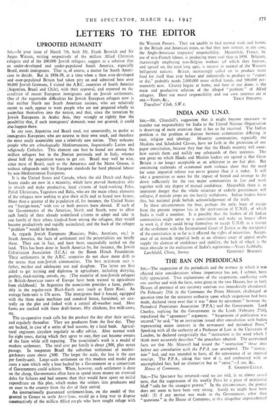THE BAN ON PERIODICALS
Slit,—The suspension of the periodicals and the manner in which it was effected raise considerations whose importance has not, I submit, been fully appreciated. Two explanations of the suspension, conflicting with one another and with the facts, were given in the two Houses, but in both Houses all pretence of any statutory sanction was immediately abandoned. On February 25th in the Commons the Prime Minister, challenged at question time for the statutory authority upon which suspension had been made, declared twice over that it was "done by agreement" between the Periodical Proprietors Association (P.P.A.) and the Government. Lord Chorley, replying for the Government in the Lords (February 27th), repudiated the " agreement " argument. "Suspension of publication was secured," he said, "by an instruction issued after consultation with bodies representing major interests in the newspaper and Periodical Press." Speaking with all the authority of a Professor of Law in the University if London, he declared categorically that "instruction is the word which think most accurately describes" the procedure adopted. The ascertained facts are that Mr. Shinwell had issued the " instruction " three days before any consultation with the P.P.A. was attempted. The " instruc- tion " had, and was intended to have, all the appearance of an imperial rescript. The P.P.A., taking that view of it, and confronted with 4 n accomplished fact, had no alternative but to "agree."—! am, &c.,


































 Previous page
Previous page